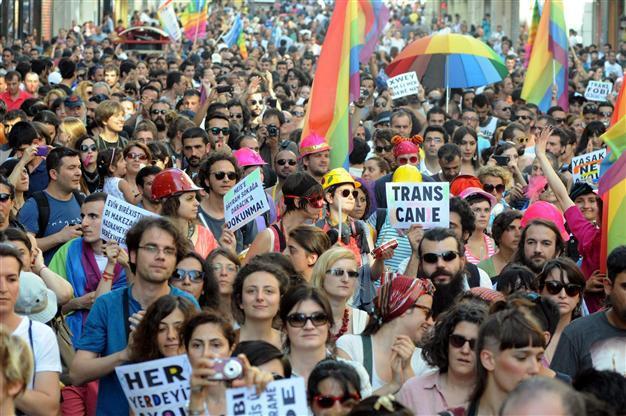Turkey’s LGBTI community celebrates landmark ruling
VAN

DHA Photo
A ruling by a local court in Turkey has likely set a new precedent in the protection of the rights of lesbian, gay, bisexual, transgender and intersex (LGBTI) people, one of the most vulnerable groups in Turkey.
The Van 5th Civil Court of Fırst Instance has refused an appeal from the governorate of the southeastern Anatolian province, which had asked for the closure of the Van Youth and Ecology Association, arguing that a section of its internal regulations violated the Turkish Civil Code, which states that “no association may be formed with an objective contrary to the law or ethics.”
“The association is active in the fields of sustainable life, organic agriculture, climate change, rural development, education, culture, social politics, arts, gender, anti-discrimination, poverty, refugees, asylum seekers, youth, children, disabled people and gender orientation,” says the association’s internal regulation in the provision appealed by the governorate.
The association faced closure after being accused of “immorality” over the provision, which states that “different sexual orientations should be supported,” its lawyer Müjde Tozbey Erden told the state-run Anadolu Agency, shortly after the local court announced its ruling earlier in the day.
In its seven-page reasoned verdict refusing the governorate’s appeal, the court referred to Article 20 and Article 22 of the U.N. Universal Declaration of Human Rights, which covers the right to freedom of peaceful assembly and association.
“Everyone, as a member of society, has the right to social security and is entitled to realization, through national effort and international co-operation and in accordance with the organization and resources of each state, of the economic, social and cultural rights indispensable for his dignity and the free development of his personality,” the court’s verdict said, quoting the articles.
“As has been the case in all countries across the world, the presence of different people who are defined with words like lesbian, gay, bisexual, transvestite or transsexual in our country is a fact that is known by everybody,” the court stated.
“For persons to have such an orientation that is involuntary, words used to describe them cannot be defined as immorality. Furthermore, this [definition of immorality] is also banned in our laws,” it added.
The court emphasized Article 33 of the Turkish Constitution, which states that: “Everyone has the right to form associations, or become a member of an association, or withdraw from membership without prior permission.”
It also referred to a 2008 ruling by the 7th Chamber of the Supreme Court of Appeals, which overturned the decision of a lower court in Istanbul that had ordered the closure of Lambdaistanbul, an LGBTI association, on the basis of the provisions of the Civil Code allowing the dissolution of associations with aims incompatible with morality.
In their defense filed to the court, lawyers for the Van Youth and Ecology Association noted that the association’s goal is the “realization of ecologic living principles by young people.”
The association’s lawyers said the concept of gender orientation cited in the internal regulation of the association is a concept of diversity and there is no single gender orientation in life according to scientific data. They underlined that this fact was also supported by earlier rulings delivered by the Supreme Court of Appeals.
A court case for the dissolution of the association would lead to a “weighty negative conviction” both in Turkey and among the international community, the lawyers said in their defense of the association. If the appeal had been accepted by the court, freedom of assembly and association in the country would have been substantially impeded, they added.
LGBTI people, particularly transgender individuals, are frequently the target of hate crimes in Turkey.
A government-led reform package, adopted by parliament in March 2014, prohibited discrimination and hate crimes, but not on the basis of sexual orientation or gender identity.
